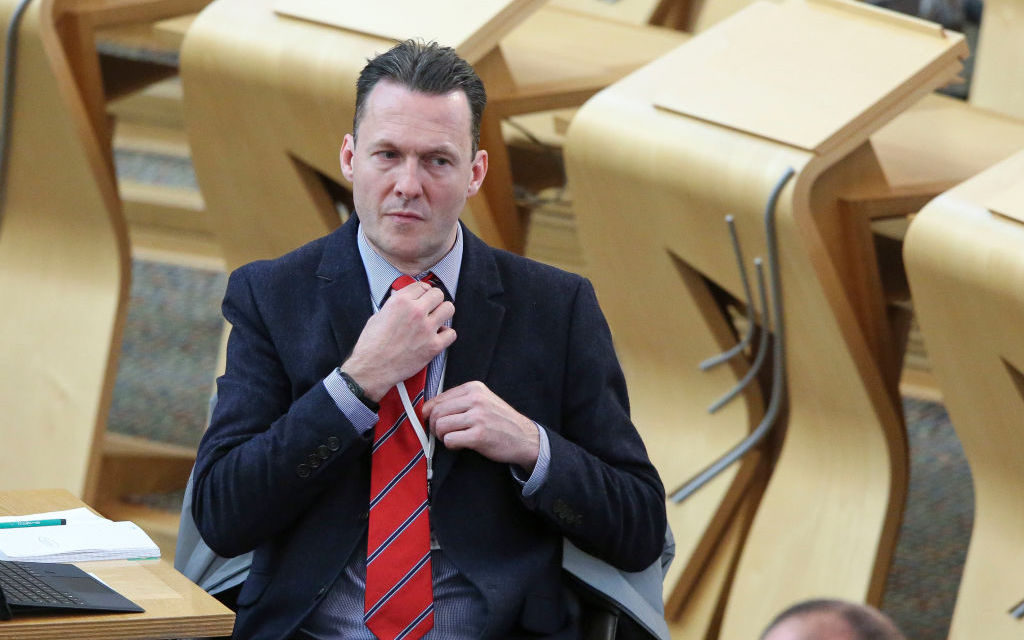Something interesting is happening in the Scottish Conservative leadership election, and while I appreciate you might be sceptical about the juxtaposition of ‘interesting’ and ‘Scottish Conservative’, there is a certain dynamic at play. Unlike the race for UK Tory leader, the contest is not between left and right, for there isn’t really a right to speak of in the Scottish Tory party. Nor is it a battle between reform and the status quo, for all three candidates are chirping incessantly about ‘change’. The real dynamic is insiders versus outsiders.
Russell Findlay is not a central casting Tory
I’ve written about this in an essay in the Mail today, but I think it’s worth fleshing out a little further. There are three candidates on the ballot: veteran MSP Murdo Fraser and newbies Russell Findlay and Meghan Gallacher. The contest is generally regarded as a straight fight between Fraser and Findlay, so that’s who I’ll concentrate on. Fraser is the longest-serving Conservative MSP and has been a member of the Scottish parliament for almost as long as that body has existed. He stood for the leadership previously, in 2011, arguing that the Scottish Tories should be scrapped and replaced by a more distinctively Scottish party called the Caledonians. He lost to Ruth Davidson who rejected a replacement party and instead led the Scottish Conservatives to their best electoral showing since 1983.
Findlay, on the other hand, comes from outside the Tory establishment. Elected to Holyrood in 2021, he is a crusading journalist who made his name exposing Glasgow’s criminal underworld and was subjected to an acid attack on the doorstep of his family home one Christmas for his troubles. Since becoming an MSP he has stood out as a rare populist voice in a parliament where most discussions never stray beyond the left-liberal consensus. He has carved out a niche for himself challenging ‘soft touch’ criminal justice policy, corruption and gender ideology. His rhetorical style is more abrasive than his Tory colleagues and he does less to conceal his contempt for Holyrood’s institutional inadequacies and progressive groupthink.
Fraser’s pitch is predominantly to members. He hopes to tap into discontent about internal decision-making processes and win support among those who feel outgoing leader Douglas Ross made too many decisions without consultation. Fraser says he would overhaul the party’s approach to formulating policy and strive for unity between the various levels of the organisation. Findlay’s pitch, on the other hand, is not merely to the members but to the voters. He dismisses talk of splitting from the UK party and says his leadership would concentrate on home ownership, more discipline in schools and tax cuts to encourage growth.
While Fraser is keen to underscore his long service in the Scottish Parliament, this can cut either way. Yes, he is a more experienced and better polished parliamentarian than Findlay, but he has stood in Perthshire North, seat of SNP leader and First Minister John Swinney, six times in a row and lost on every occasion. He owes his entire tenure as an MSP to the regional list of ‘top up’ seats designed to make Holyrood more proportional. If, after a quarter century of trying, he still can’t win in his own backyard, what chance does he stand of doing so Scotland-wide?
Findlay is running against this kind of Toryism as much as he is the SNP and Labour. He sees the Conservative party not as a debating society but as a vehicle for taking on socialism and nationalism. He wants to put the Tories in the service of those Scots with conservative instincts who have been unwilling to vote for any Conservative other than Ruth Davidson. He regards voters as the ultimate outsiders in a political climate of closed-mindedness and conformity among elites.
That is what makes this contest so compelling. Russell Findlay is not a central casting Tory. He has one foot in the Conservative party and the other in the world inhabited by people who don’t vote Conservative. He understands them and what makes them tick. He speaks their language and knows how they think about politics. While his rival aims to unite party insiders, Findlay wants to reach past them, to the outsiders, and persuade them to join the Tory fold.








Comments